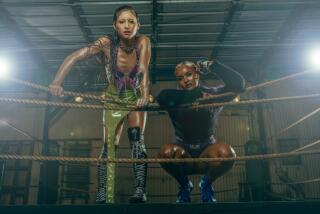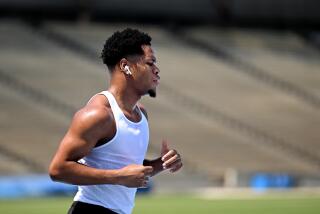JOHNNY’S QUEST : Bray’s Pursuit of Heavyweight Title Began at the Tender Age of 5
- Share via
Ask a kid what he wants to be when he grows up and most will scratch their head, roll their eyes, break into a big smile and give you options like: a fireman, an athlete, a magician or maybe a starship commander.
The general reaction is to pat them on the head, send them on their way and marvel at the innocence of youth.
That was what John Bray usually got. When people asked him what he wanted to be, he replied, “Heavyweight champion of the world.”
A rather ambitious fantasy for a 5-year-old. A lot of youngsters dream about a life in the ring, but how many start acting out that dream at age 7?
While his peers were playing Little League, or soccer, or just hanging out on their skateboards, Bray was hanging out at a Van Nuys gym.
Bray’s love of boxing began in 1975 when he saw Muhammad Ali beat Joe Frazier in the “Thrilla in Manila.”
Two years later, Bray begged his mother, Susan, to take him to Frankie Goodman’s gym.
“I was never athletic as a small child,” Bray said, “but I had this fascination for boxing. What really captured me was the way people reacted to Ali, even before the fight. Seeing his personality. I liked the fact the crowd was just for him , not any other players like they would be in a team sport. Boxing was just something I wanted to do from the third grade on. It was strange.”
Bray finally persuaded his mother to let him sit at the Goodman gym and soak in the atmosphere.
“She thought I was crazy,” he said, “but she would do anything for her children.”
Bray was one of six kids, one of four boys. No one else in his family had any interest or experience in the fight game.
When he first wandered into Goodman’s gym, Bray wondered why his interest was so strong.
“It was a dirty place,” Bray said. “Real grubby looking. But soon, I saw beyond that. I saw that I could learn. This was not just a violent sport. This is what I want to be, I told myself. I wanted to be champ. Not just any champ. The heavyweight champion.
“I didn’t realize that because I’m Mexican, I would probably not be a heavyweight. I would be short and fat.”
At age 9, Bray started living his dream. He began hitting a punching bag in a neighbor’s back yard and then joined a Valley amateur boxing team run by Larry Loy.
Again, his dream was blurred by his first taste of reality.
At age 11, he was fighting, but not well. He lost his first four matches.
“I thought maybe this was not for me,” Bray said. “I was getting hurt, getting black eyes. My mother would see me come back with a busted lip and glove marks on my shoulders and she would be crying for me not to do it. But in everything, if you want it, you need to make sacrifices. I kept begging her or I would sneak out to go to the gym. She finally realized she couldn’t stop me.”
After two years of fighting for Loy, Bray stopped himself by breaking his arm while fooling around with friends. That sidelined him for a year and a half.
When he returned, Bray joined Mike Salas’ boxing team at the Baldwin Park Boys Club and his career took off. In 1985, fighting as a junior middleweight, Bray won the district finals of the Junior Olympics, run by the Amateur Boxing Federation. He then went on to capture the state title, qualifying for the National Junior Olympics, in which he won a bronze medal. The same year, Bray competed in the Police Athletic League’s national championships in Albuquerque, N. M., and won the junior middleweight title on a first-round knockout.
In 1986, Bray returned to the Junior Olympics as a light heavyweight. Again he won at the district and state level, then added a national title in Raleigh, N. C. He was also named the outstanding boxer at the nationals.
Suddenly, Bray’s childhood dream didn’t seem so ridiculous. Not even the part about being a heavyweight champion. Short and fat? Bray was growing up lean and mean. At 18, he is 6-foot-4 and 190 pounds, but even three years ago, the Van Nuys High student had grown enough to attract the attention of veteran manager-trainer Lou Duva.
Duva was looking for a sparring partner for Evander Holyfield, the 1984 Olympic bronze medalist as a light heavyweight and, subsequently, a world cruiserweight champion.
Bray took the job with some trepidation.
“I was scared,” he said. “No doubt about it. But I realized this guy, Holyfield, was a man just like I am. He has just two arms and two legs. I didn’t feel my skills were any less. His strength was a factor, but not anything else. I went in there with that attitude.
“Here he was, a cruiserweight champion of the world. When I found he couldn’t hurt me, I figured there shouldn’t be anybody in the amateur world who could hurt me.”
Hurt? No. Frustrated? Yes.
When Bray returned to the amateur wars in a bid to make the 1988 Olympic team, he was not battle-ready. He lost a decision in the final of the Western Olympic Trials to Tom Morrison, who went on to lose to Ray Mercer, the eventual gold-medal winner, in the Olympic Trials.
“I might have stayed with the pro program too long,” Bray said of his sparring days. “It might have hurt my style. The pros are more laid back because they know they’re going 12 rounds. With only three rounds in the amateurs, you’ve got to get your punches off quickly.
“If I had gotten the chance to fight Mercer, who knows? I might have beaten him. If I had, my life style now would be a lot different.”
His life style might not be anything Robin Leach would be interested in, but Bray has no complaints. Still a teen-ager, he finds himself invited more and more to represent the United States internationally. Last year, he split two bouts on a Scandinavian tour, breaking the jaw of one opponent.
This past March, he won a decision over Sean O’Reagan, the Irish national champion, and, several weeks ago, took part in the U. S.-U. S. S. R. Amateur Boxing Dual in Orlando, Fla., losing to Viktor Akshonov.
Bray, who won a bronze medal in the ABF nationals this spring, is ranked third by that organization among heavyweights.
With a 74-8 amateur mark and 49 knockouts, he has come a long way since he sat wide-eyed in Goodman’s gym so many years ago. The question is: Where does he go from here?
A crossroads looms. Does he turn pro and pursue his childhood obsession with the heavyweight title? Or does he remain an amateur and first seek that elusive Olympic gold?
“He’s contemplating turning pro,” Duva said. “He’s a good prospect who knows how to box. It’s when he tries to fight you that he gets in trouble. He’s no great puncher, but he’s intelligent. He needs to get maturity. He must become a man. Men fight differently. Especially heavyweights.”
Money is the key element in Bray’s decision. He is hoping to get as much as $600 a month from the ABF through its Operation Gold program.
“If that comes through,” he said, “I think I will stay amateur and follow my dream of winning the Olympic gold.”
That’s the advice he has received from Dan Goossen, head of the Ten Goose Boxing Club of Van Nuys. Bray has been working out at the Ten Goose gym recently.
“I think he has one heck of a future representing the U. S. in 1992,” Goossen said. “He’s a young man of 18. By the time the Olympics come around, he’ll only be 22 and he will have gained valuable international experience. If he wins the gold, he could be the biggest thing to have ever come out of the Olympics. If he wins, he could be the wealthiest ever.”
Might Goossen share in that wealth by signing Bray?
“We always are interested in representing the best in the world,” said Goossen, who manages International Boxing Federation middleweight champion Michael Nunn. “But right now, we’re not thinking in that direction. John Bray is an amateur, not a pro. We manage professionals. I would like to see the young man go to the Olympics. It’s premature to discuss dollars and cents with him. Time will tell.”
But when it comes time to talk dollars and cents, Bray indicates that he will be as tough as he has been in the ring.
“I have no ties, no contract,” he said. “Whoever wants to help me the most, I will sign with. I think Lou Duva is the best promoter out there, better than Don King or anybody.
“But I think Ten Goose is the best of tomorrow. It comes down to who will do the most for me. I am tired of being somebody’s sparring partner. I’ve got to look out for John Bray.
“My dream is now a quest.”
More to Read
Go beyond the scoreboard
Get the latest on L.A.'s teams in the daily Sports Report newsletter.
You may occasionally receive promotional content from the Los Angeles Times.










